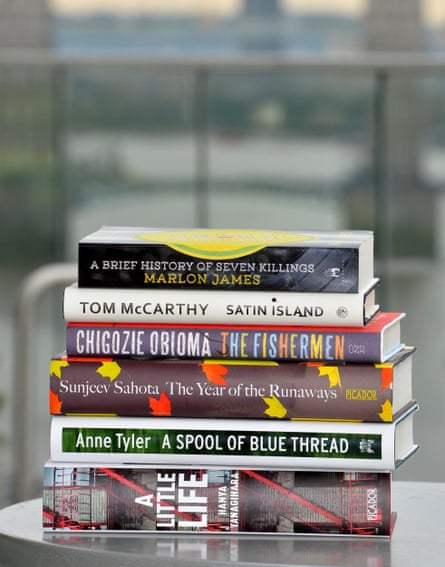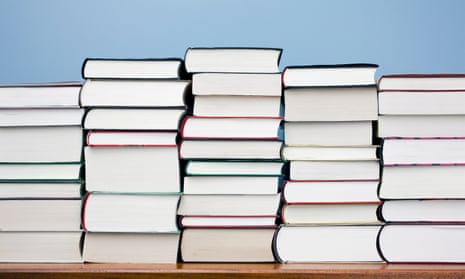Books are steadily increasing in size, according to a survey that has found the average number of pages has grown by 25% over the last 15 years.
A study of more than 2,500 books appearing on New York Times bestseller and notable books lists and Google’s annual survey of the most discussed books reveals that the average length has increased from 320 pages in 1999 to 400 pages in 2014.
According to James Finlayson from Vervesearch, who carried out the survey for the interactive publisher Flipsnack, there’s a “relatively consistent pattern of growth year on year” that has added approximately 80 pages to the average size of the books surveyed since 1999.
For Finlayson, much of this shift can be explained by the industry’s shift towards digital. “When you pick up a large book in a shop,” he says, “you can sometimes be intimidated, whereas on Amazon the size of a book is just a footnote that you don’t really pay all that much attention to.” The rise of digital reading is also a factor, he adds. “I always hold off buying really big books until I’m going on holiday, because I don’t want to lug them around in my bag. But if you have a big book on a Kindle, that’s not a consideration.”
The literary agent Clare Alexander agrees that long books are more portable in electronic formats, but points out that much ebook reading is focused on genres such as romance, crime and erotica. For Alexander, the gradual increase in size is evidence of a cultural shift.
“Despite all the talk of the death of the book because of competition from other media,” she says, “people who love to read appear to prefer a long and immersive narrative, the very opposite of a sound bite or snippets of information that we all spend our lives downloading from Google.
“The Americans have led the way – think Donna Tartt, Jonathan Franzen, Hanya Yanagihara and most recently Marlon James (Jamaican but living in America) – but they are not alone. Hilary Mantel from the UK or Eleanor Catton from New Zealand have both written long novels, and if you look through that list you will see how many of these have won prizes. So clearly the literary establishment loves long books too.”

The Man Booker prize has been a pillar of the literary establishment in the UK since the 1970s, and evidence of expansion can be found in the roster of winners. The first five years of Booker-winning novels average out at around 300 pages, but even taking into account Julian Barnes’s 2011 triumph with his 160-page novella The Sense of an Ending, the last five years of Booker laureates weigh in at an average of 520 pages. This year’s winner was brief only in name: Marlon James’s 700-page A Brief History of Seven Killings.
For Max Porter, the editor at Granta who published the 800-page Booker winner of 2013, Eleanor Catton’s The Luminaries, it’s difficult to get a sense of a shift across the whole market but it’s “heartening to see these big, ambitious books appearing”.
“All across culture, people are trying to work out whether content is going to become mobile, what devices people are going to be using to consume it,” says Porter, “so I’m quite encouraged by the big, fat book sitting there saying: ‘read me’.”
The rise of the television box set, where viewers will commit to spending dozens of hours following a single narrative, has encouraged publishers to support writers exploring a bigger canvas, Porter continues. “It’s shown that people have the appetite, patience and stamina to stick with a plot and characters as they develop over a large span.”
Big books may be more convenient to carry on an electronic reader, but Porter isn’t convinced that digital reading is driving any increase in size, citing studies showing that only 60% of books bought electronically are ever begun, and completion rates that can fall as low as 20% for some titles. “A big book inhabits the space you’re in,” he argues, “it’s a physical embodiment of your intention to spend the time necessary to read it”. The contemporary novel’s increasing girth can instead be put down to a confident assertion of identity. “The novel has come into its own novel-ness. There so many demands on our attention, so many competing forms, that these novels have decided to relish being big and long, to demand that you sit in a chair, turn off your phone and devote some time to them.”
“This year has had its glut of big novels,” says Alex Bowler, the editor at Jonathan Cape who published Garth Risk Hallberg’s 900-page debut novel City on Fire in the UK. He says the increase detected by the Flipsnack survey isn’t reflected in what comes across his desk. “The high-profile books have seemed fairly long, but I’m not inundated with 200,000-word novels. Two-hundred-and-fifty to 350-page novels have been the majority of what I’m seeing on submission, and I suspect that’s also the majority of what’s out there.”
Bestseller lists have been dominated over recent years by series, ranging from Harry Potter to EL James’s Fifty Shades trilogy. “I suspect they’re chunkier on the page than in their word count,” Bowler continues. By altering the spacing on the page, increasing the leading or using a slightly larger font, publishers can choose to give a novel some additional weight. “It may be that a genre audience wants a chunkier feel to the books they’re buying.”
The sense of value for money offered by a longer book used to be a consideration in the days of commercial sagas, literary agent Clare Alexander admits, and may still influence some readers today – but she says this desire for a substantial read doesn’t explain the growth in the literary novel.
“I would argue that a countervailing force is also in play with the revival of interest in the short story (also reflected in a growing and excellent prize culture) or the brief but perfectly formed novel.”
These days, the real struggle is publishing an unremarkably-sized book. “As an agent, the most difficult area now appears to be the middle. Mid-list, mid-career, middle-sized – in fact anything that’s middling.”

Comments (…)
Sign in or create your Guardian account to join the discussion